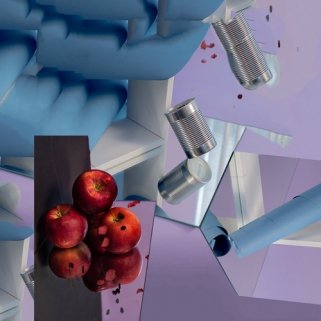Graduate Student Profile: Ben Jackson
Light Work‘s lab and community spaces serve as a home base for many graduate and undergraduate students at Syracuse University. With this series of blog installments, we wanted to showcase the work of a few of these recent graduates who have actively used our spaces in the creation of their thesis projects.
Today, we interview Ben Jackson, whose work you can find here.
LW: Where did you grow up? How does that affect your work?
I grew up in Modesto, CA. It is a city in the central valley of California, not near any of the famous fun parts. It can look more like Kansas than any preconception of the Golden State. It played a role in some of my early work, but I would have trouble placing that now.
LW: What are you focusing on in your current work?
My current work is exploring still life and also the notion of realism in photography. I heavily use Photoshop to treat the surface of the photographs I make. The photographs start from play on a tabletop with a few objects. I am not exactly sure what the final product will be when I start shooting. My relationship to Photoshop and the tools within the program have become more intuitive and less about rules towards a specific output.
LW: What do you consider a successful photograph?
A successful photograph, or really any piece of art, is the one I am still thinking about when I go to bed, long after the critique or the gallery show. Anything that keeps me up at night really. Which may be a more scrutinous way to judge success than other qualifiers.
LW: Are there any recent examples of works that left you thinking?
John Baldessari is one of my favorite artists of all time. He has this piece where it is a series of photographs of a hand pointing at one of three green beans. The process goes along in the hand deciding which one through the series of images. It is visually simple and at first kind of dumb and absurd. Which is the beauty in it really, it’s so smart. It comes down to making choices, and as artists that is something we have to do constantly. The work so intelligently and simply portrays that idea, I tend to think about it a lot, when I am making decisions.
LW: Talk about the title of your thesis show…
Does my thesis show have a title? I don’t think it does. I never gave it one. But my thesis paper has a working title of…
Digital intervention with the photographic surface as a means of fighting against the magic of the black box
LW: Tell me more about what you explore in your thesis paper…
I am trying to talk about it aesthetics in photography, and also how photographs are constructed. My work has a pretty bright color palette. Something I picked up from a book on robotics from the mid 80s. The book was weird and tacky but I loved these brilliant colors I found. I also am really interested in how Photoshop has come to inform images we see today.
LW: What artists are you looking at right now?
Oh man, so many. John Houck is amazing, I wish I was that smart. Letha Wilson, Kate Steciw, Joshua Citarella, Sean McFarland, Lucas Blalock. I still love everything John Baldessari does. And I will never stop going back to Barbara Kasten’s work, her stuff is amazing and she has been working for so long, she does not get enough recognition to me.
LW: How has your work shifted in your time at SU?
My work shifted drastically while here. I came here photographing my family, left shooting tabletop still life and having no restraint in how I choose to explore Photoshop and digital software to affect the surface of a photograph. There were burning questions inside me when I was an undergrad, about how people treated and interacted with photographs, I came here and instantly had an existential crisis, I spent the the next three years dealing with that.
LW: How did you find Light Work?
I was first shown Light Work when I was touring here the fall before I started at Syracuse. I went to undergrad at a small college tucked away in the redwoods in Northern California where we hardly ever had any artist visit (Five hours north of San Francisco, and 6 hours south of Portland, OR). To discover a place where so many artists would be coming in out seemed unreal to me at the time.
LW: What resources or artists have you connected to there?
I got to work with Aspen Mays my first year. That was really exciting for me, I love her work and she was a really awesome person to get to connect with. It was great to reconnect with her when she returned for her show this spring.
LW: Graduate School creates a space both for education and for artmaking. How have both of those spaces informed each other?
For me they are inseparable anyways. I am constantly educating myself and reading, which is at times directly, and indirectly informing my art practice. Art making is way of educating yourself, about a material, or an idea. You get better at it, and understand it better though repetition and continuously tackling it.
LW: What are your plans after graduating?
I am returning to California, being out here has been great, but I really miss the west. I will be moving to the San Francisco Bay Area. I just started the hiring process to teach a couple photography courses at the junior college I attended where I first ever used a darkroom.




Leave a Reply
Want to join the discussion?Feel free to contribute!